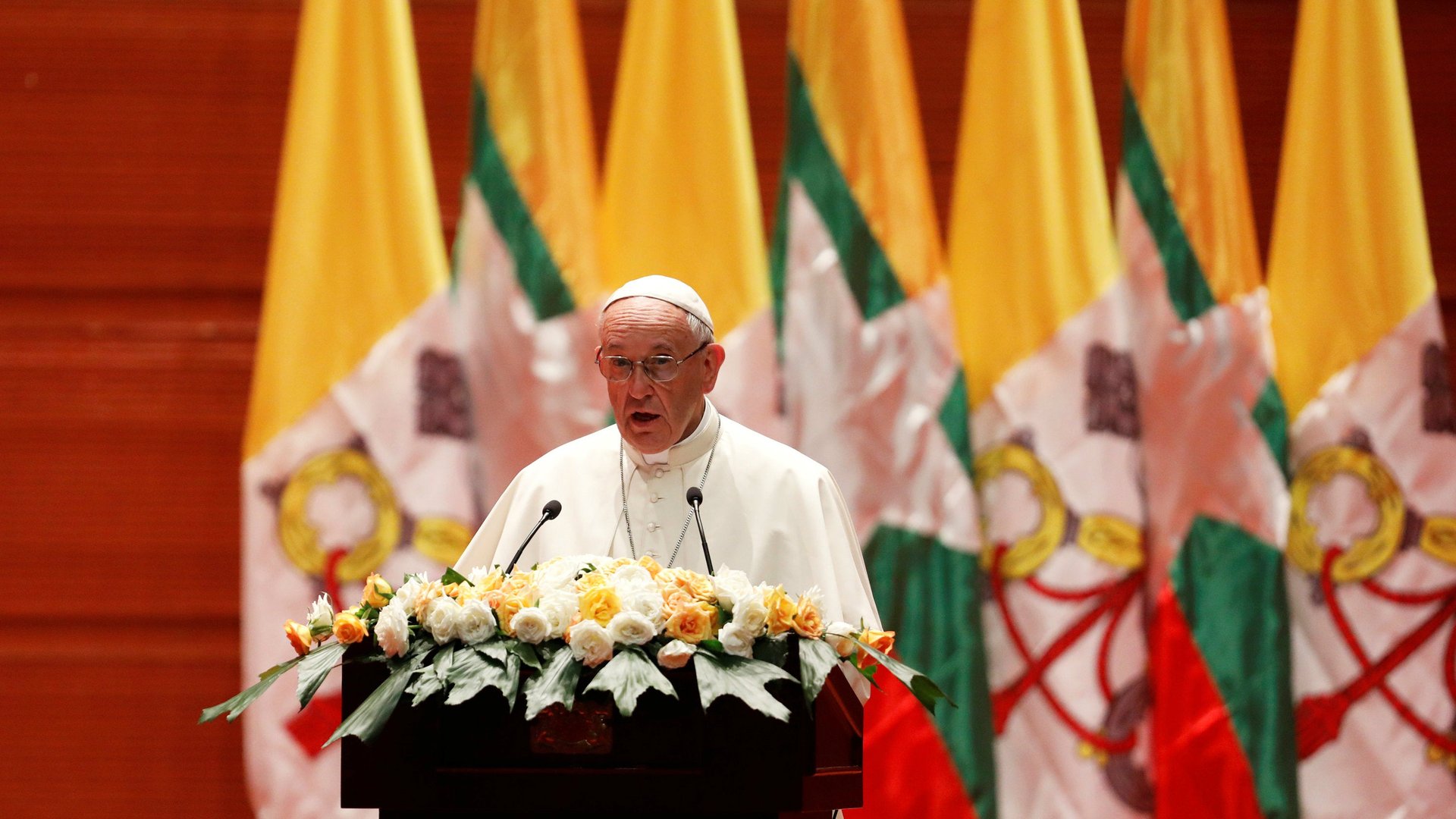No, Pope Francis wouldn’t say “Rohingya” in Myanmar. Yes, it matters
Pope Francis did not mention the persecuted Rohingya minority by name during a highly anticipated speech in Myanmar today (Nov. 28). And it matters.


Pope Francis did not mention the persecuted Rohingya minority by name during a highly anticipated speech in Myanmar today (Nov. 28). And it matters.
In address made to Myanmar’s civilian leader Aung Suu Kyi, the country’s diplomatic corps, military officials, and Vatican clergy, the pope offered careful words to argue that religious differences should be a source for unity, not division.
Francis said Myanmar was suffering from civil conflict and hostilities “that have lasted all too long and created deep divisions” and that the Southeast Asian country should respect all religious groups, but never uttered the word “Rohingya.” Tens of thousands of members of the largely Muslim ethnic minority have fled Buddhist-dominated Myanmar for Bangladesh after facing violent retaliation following a militant attack. The exodus has created a humanitarian crisis in both countries.
“The future of Myanmar must be peace, a peace based on respect for the dignity and rights of each member of society, respect for each ethnic group and its identity,” he said. “Religious differences need not be a source of division and distrust, but rather a force for unity, forgiveness, tolerance and wise nation-building.”
Words, and where they are said, are important
The word “Rohingya” is very contentious inside Myanmar. The government doesn’t consider the Rohingya citizens and instead refers to them as “Bengalis,” foreigners, and sometimes even terrorists. In referring to the Rohingya as “Bengalis,” the government designates the group as the “other,” justifying their persecution and disenfranchisement.
In Myanmar, using the term implies the speaker sides with the Rohingya and is against the government’s view. Papal advisors had warned him that using the word during his first visit to the country could exacerbate the tense situation and also put the country’s very small Christian population at risk.
However, human-rights advocates believe the situation in Myanmar, called a “textbook example” of ethnic cleansing by the top UN human-rights official, is so severe it warranted condemnation from a pope with a global reputation for championing the plight of the oppressed.
It might be hard to find a people more oppressed. As Quartz’s Aamna Mohdin wrote last month:
In 2009, a UN spokeswoman described the Rohingya as “probably the most friendless people in the world” and it’s easy to see why. In 2015, the plight of the Rohingya was brought to the forefront when boats packed with Rohingya migrants were left stranded at sea. The Rohingya—collectively dubbed across international media as “boat people”—were stuck because they were turned away from a number of Southeast Asian countries, including Malaysia, Indonesia, and Thailand. Unwanted in Myanmar, the Rohingya are also often rejected from the countries they hope to flee to.
Since the late 1970s, nearly one million Rohingya are estimated to have fled Myanmar. The 2014 census—which the UN helped conduct—banned the use of the term “Rohingya.”
The use of papal discretion
It’s not uncommon for the pope to avoid directly criticizing his hosts while making trips abroad. On a recent visit to Egypt, where president Abdel Fattah el-Sisi has been accused of human-rights abuses and sharply limiting democracy, Francis spoke of peace and unity and only broadly warned of the “demagogic forms of populism.”
Yet some human-rights groups and other observers felt the Myanmar speech was a missed opportunity for the pope to demonstrate global support for the Rohingya people.
The pope has spoken the word before
The EU ambassador to Myanmar, Kristian Schmidt, said the speech was a success and that it wasn’t necessary for Francis to address the crisis directly. “It was written all over the speech, between the lines,” he told the Guardian. “It doesn’t have to be about specific words. It was all about values. And on values it was absolutely eloquent and strong.”
Quartz’s Tripti Lahiri noted this week that the pope has used “Rohingya” in the past. During a Aug. 27 address at the Vatican, Francis said he was following the “sad news of the religious persecution of our brother and sister Rohingya” and called for them to have “full rights.”
The pope’s visit to Myanmar comes after over 620,000 Rohingya have fled the Rakhine state—where the military has killed, raped, and burned Rohingya victims since August—to the southern tip of Bangladesh.
Francis is expected to travel to Bangladesh later this week to meet with Rohingya refugees, which raises more questions about how effective his trip can be. Will a private gathering with a small group present the opportunity to voice condemnation of what some are calling mounting evidence of genocide? And, face to face, will the pope be able to address the Rohingya by their name?